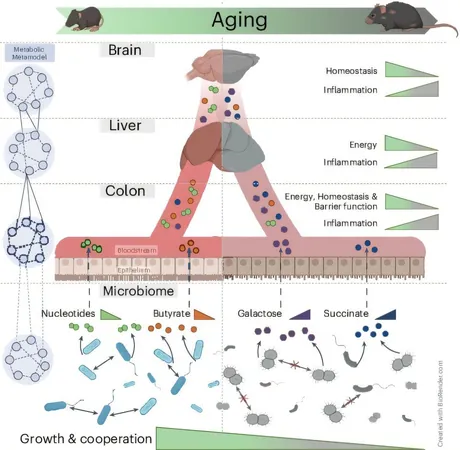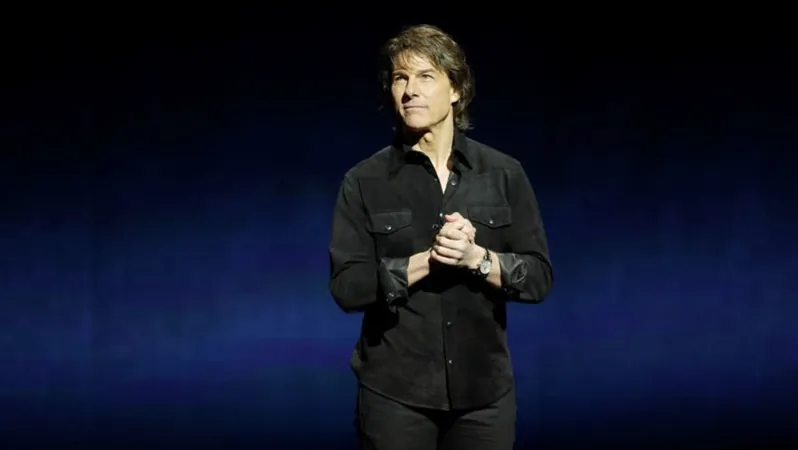
Groundbreaking Study Unveils How Aging Microbiome Impacts Our Health—And What Can Be Done About It!
2025-04-04
Author: Yu
The Role of the Gut in Aging
The gut is a fascinating and complex ecosystem made up of trillions of microorganisms known as the gut microbiome, which plays a crucial role in our overall health and can significantly influence the aging process. Recent research has unveiled exciting insights into how the microbiome "ages" and, alarmingly, how it can accelerate aging in its host.
Led by Professor Christoph Kaleta of Kiel University and Dr. Christiane Frahm from Jena University Hospital, a research team set out to uncover the mechanisms that the microbiome employs to govern aging. Their findings, which were featured in the prestigious journal Nature Microbiology, reveal a drastic decline in the microbiome's metabolic activity as organisms age.
Kaleta emphasized, "These metabolic changes don't just affect the microbiome; they directly alter the metabolic processes in the host," highlighting the profound interconnectedness between our gut health and overall well-being.
The research was part of the Marie Sklodowska-Curie Innovative Training Network SmartAge under the Horizon 2020 initiative. Combining Kiel's expertise in metabolic modeling with Jena’s experimental data proved pivotal for the investigation.
The Role of the Gut in Aging
The team developed computer models simulating the metabolism of both gut bacteria and the host, employing molecular biological data from tissues and stool samples from mice of varying ages. Their findings revealed a startling age-related decline in the microbiome’s function, indicating that different bacterial species become less cooperative and begin to compete for nutrients, directly affecting essential bodily functions.
Lena Best, the study's first author, noted, "This decline can impede critical processes such as maintaining the intestinal barrier, as well as essential repair mechanisms."
Harnessing the Power of Young Microbiomes
In a complementary study led by Professor Philip Rosenstiel, it was found that transferring stool from young mice to older ones every eight weeks over a two-year period could rejuvenate both the microbiome and the host. This innovative procedure led to improved motor coordination and even preserved the integrity of the intestinal barrier.
Impressively, markers of "inflamm-aging," a chronic low-grade inflammation linked to aging, significantly decreased in the treated mice.
"These results demonstrate the pivotal role the microbiome plays in age-related changes in the host and offer promising avenues for microbiome-targeted therapies," Kaleta stated enthusiastically.
A Future with Microbiome Therapies
With these remarkable findings, researchers are now looking into how we can specifically revive the aging microbiome. Potential solutions may include specialized dietary supplements or therapies aimed at enhancing microbial function, opening up a new frontier in age-related healthcare.
This exciting research position the microbiome as a crucial player in combating the effects of aging, offering hope for innovative treatments that could enhance our health as we grow older. Could your gut be the key to living a longer, healthier life? Stay tuned as science continues to unveil the wonders of our microbial friends!



 Brasil (PT)
Brasil (PT)
 Canada (EN)
Canada (EN)
 Chile (ES)
Chile (ES)
 Česko (CS)
Česko (CS)
 대한민국 (KO)
대한민국 (KO)
 España (ES)
España (ES)
 France (FR)
France (FR)
 Hong Kong (EN)
Hong Kong (EN)
 Italia (IT)
Italia (IT)
 日本 (JA)
日本 (JA)
 Magyarország (HU)
Magyarország (HU)
 Norge (NO)
Norge (NO)
 Polska (PL)
Polska (PL)
 Schweiz (DE)
Schweiz (DE)
 Singapore (EN)
Singapore (EN)
 Sverige (SV)
Sverige (SV)
 Suomi (FI)
Suomi (FI)
 Türkiye (TR)
Türkiye (TR)
 الإمارات العربية المتحدة (AR)
الإمارات العربية المتحدة (AR)